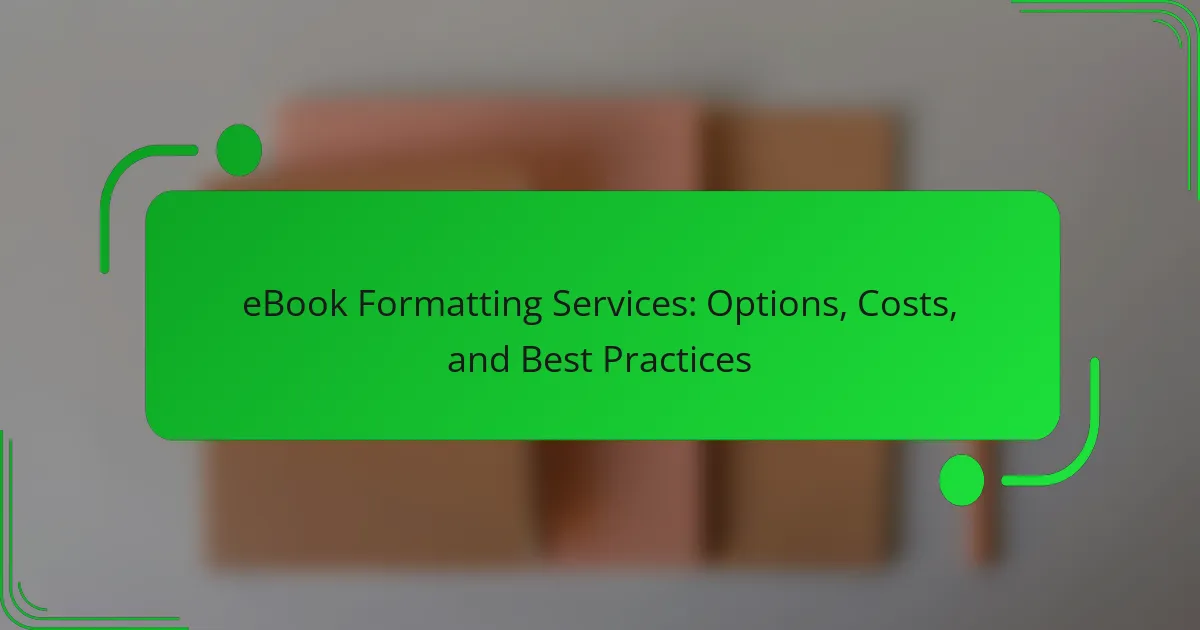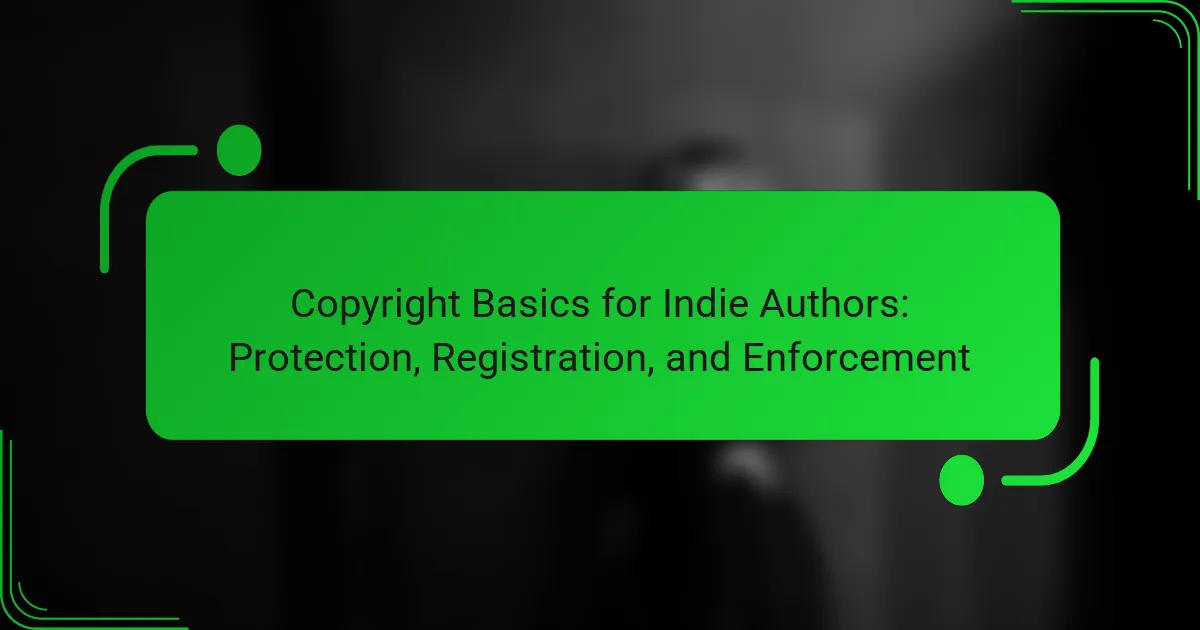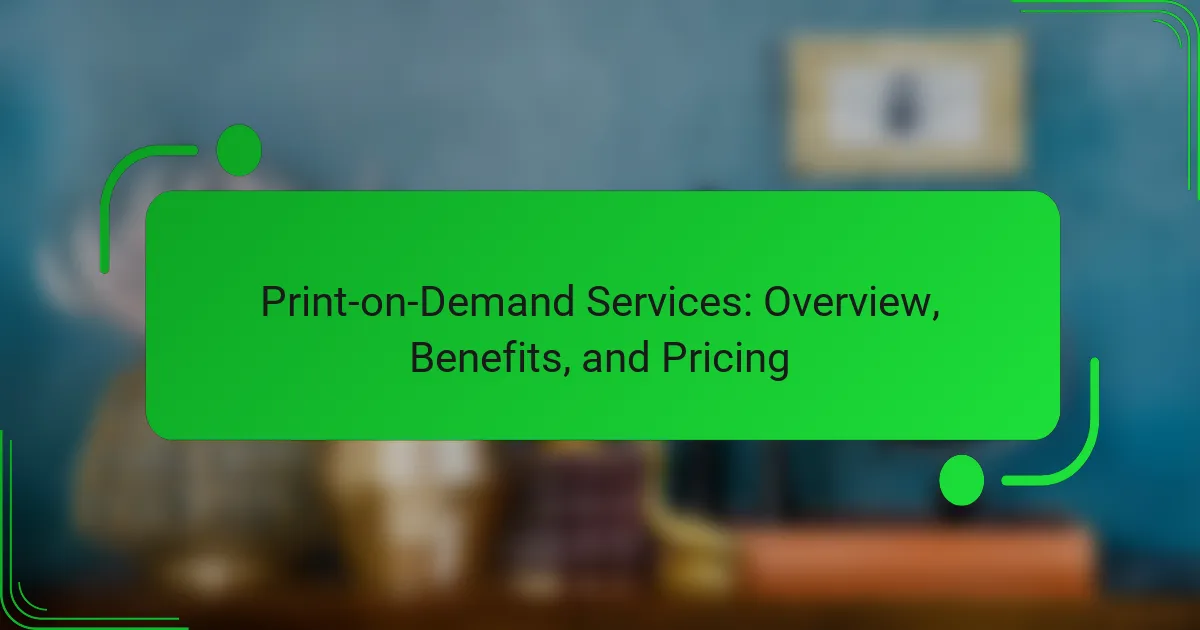Indie author communities provide essential networking opportunities and resources that can enhance an author’s career. These communities facilitate connections with fellow writers, offer valuable insights and feedback, and share marketing strategies and publishing advice. Regional variations influence how authors engage, with platforms like Facebook, Twitter, and Goodreads playing key roles in networking. Events such as book fairs, workshops, and online webinars further promote collaboration and visibility among indie authors.
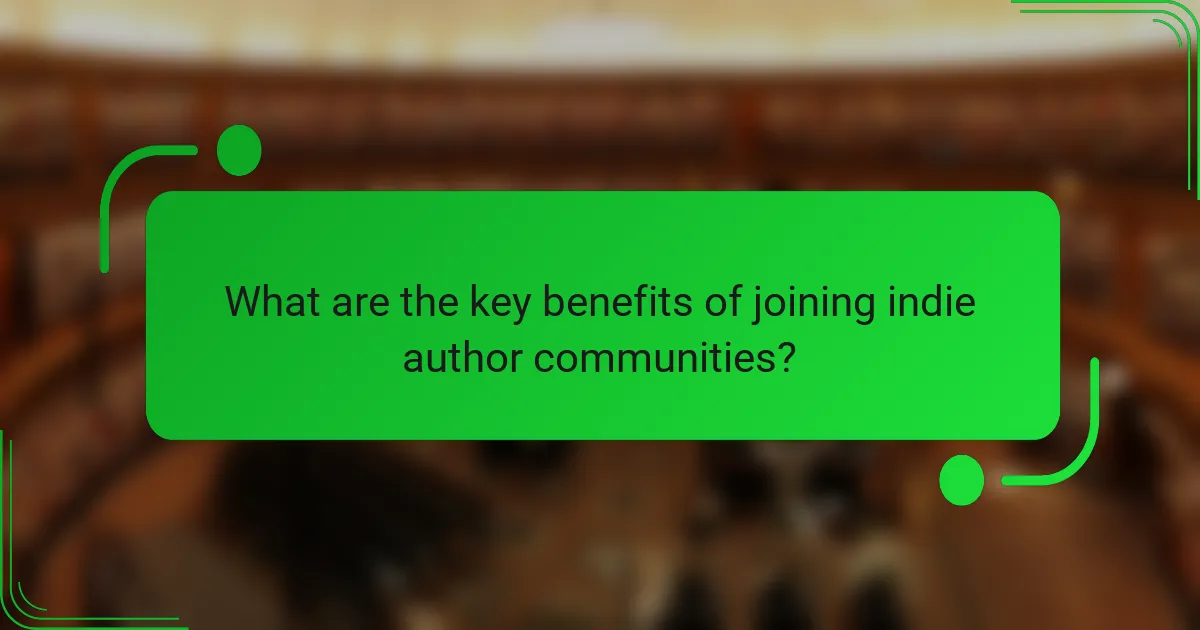
What are the key benefits of joining indie author communities?
Joining indie author communities offers significant benefits, including networking opportunities, resource sharing, and support. These communities foster connections with fellow writers, providing access to valuable insights and feedback. Members often share resources such as marketing strategies, writing tools, and publishing advice. Additionally, these communities create a supportive environment where authors can collaborate, share experiences, and motivate each other, enhancing their writing journey. Engaging with these networks can lead to increased visibility and opportunities for authors to promote their work effectively.
How do these communities enhance networking opportunities?
Indie author communities significantly enhance networking opportunities by fostering connections among writers, publishers, and readers. These communities provide platforms for collaboration, feedback, and support, which are crucial for career growth. Members can share resources, attend events, and participate in workshops, expanding their professional networks. Additionally, unique attributes like genre-specific groups or regional meetups offer tailored networking experiences that cater to specific interests and needs.
Which resources are commonly shared within these communities?
Indie author communities commonly share resources such as writing workshops, critique groups, marketing strategies, publishing advice, networking events, and online forums. These resources facilitate collaboration and support among authors.
What role does collaboration play in indie author success?
Collaboration significantly enhances indie author success by providing networking opportunities and shared resources. Engaging with fellow authors fosters support and knowledge exchange, which can lead to increased visibility and sales.
Indie author communities often offer workshops, critique groups, and promotional events that empower authors to hone their craft and market their work effectively. For example, participating in collaborative projects can broaden an author’s audience and create valuable connections within the literary world.
These communities also provide access to essential resources such as publishing tools, marketing strategies, and industry insights, which are crucial for navigating the competitive landscape. As a result, collaboration not only enriches the individual author’s journey but also strengthens the indie publishing ecosystem as a whole.
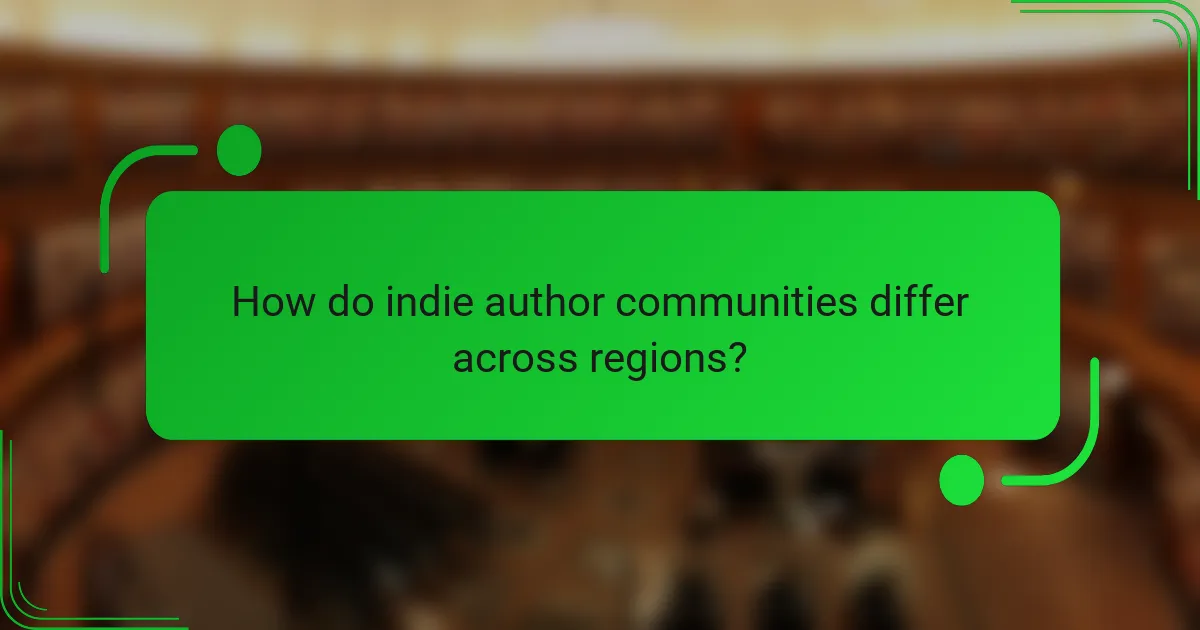
How do indie author communities differ across regions?
Indie author communities vary significantly across regions due to cultural differences, resources, and networking opportunities. In North America, for example, there is a strong emphasis on digital marketing and social media engagement, facilitating broader reach. Conversely, European indie authors may focus more on local literary events and traditional publishing ties.
In Asia, indie author communities often leverage online platforms for collaboration, reflecting the high digital engagement in many countries. Latin America tends to emphasize community-building through local meetups and workshops, fostering strong personal connections.
Each region’s unique attributes shape its indie author community dynamics, influencing how authors connect, share resources, and promote their work.
What are the unique challenges faced by indie authors in different markets?
Indie authors face unique challenges in various markets, including limited visibility, competition with established authors, and varying reader preferences. These factors affect their ability to connect with audiences and access resources.
In niche markets, indie authors often struggle with finding the right platforms to showcase their work. They may lack the marketing budgets that traditional publishers have, making it harder to reach potential readers. Additionally, cultural differences in different regions can influence how stories are received.
Networking opportunities can vary significantly. Some markets may have robust indie author communities that provide support and resources, while others may lack such networks, leaving authors isolated.
Lastly, indie authors often face challenges related to distribution. Different markets have varying distribution channels and requirements, complicating the process of getting their books into readers’ hands.
How do cultural factors influence community engagement?
Cultural factors significantly shape community engagement by influencing values, communication styles, and social norms. These elements create a framework that affects how indie authors connect and collaborate. For instance, cultural backgrounds can determine preferred networking methods, whether through informal gatherings or structured events. Additionally, cultural perceptions of authorship and creativity may impact participation levels in community activities. Understanding these dynamics fosters a more inclusive environment, enhancing resource sharing and support among indie authors.
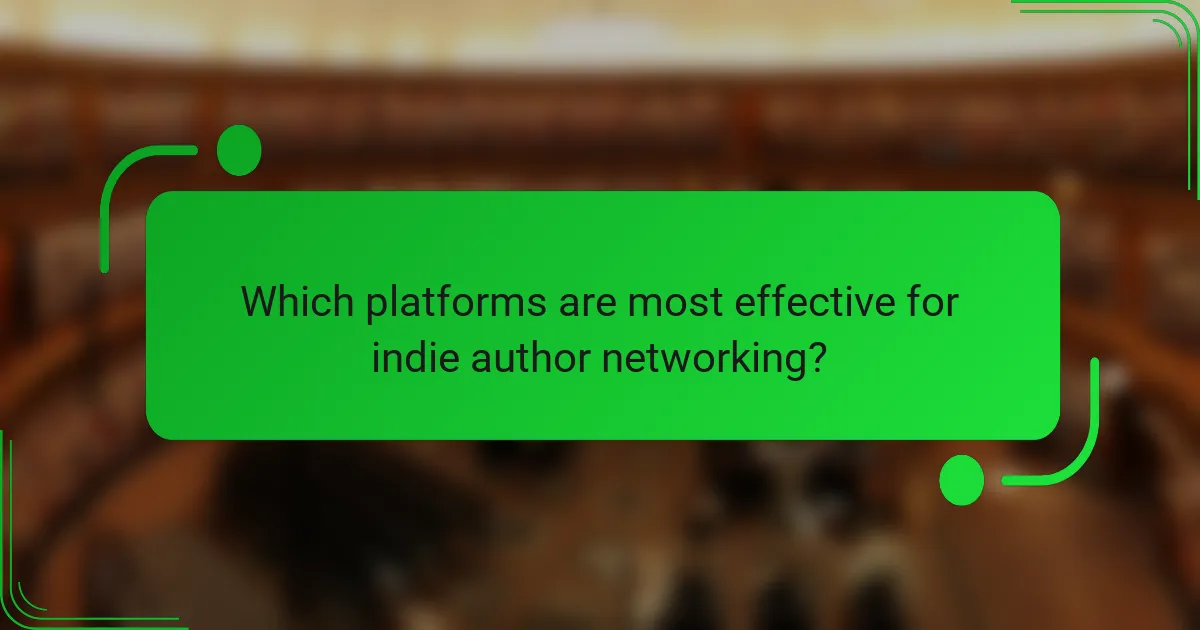
Which platforms are most effective for indie author networking?
Social media platforms, writing forums, and dedicated author websites are most effective for indie author networking.
Facebook groups offer community engagement and support, while Twitter facilitates real-time conversations. Goodreads allows authors to connect with readers, and LinkedIn provides professional networking opportunities. Additionally, platforms like Wattpad enable authors to share their work and receive feedback. Each platform caters to different aspects of networking, enhancing visibility and collaboration among indie authors.
What features make online platforms beneficial for indie authors?
Online platforms provide indie authors with essential networking opportunities and resources. These platforms facilitate connections with fellow writers, industry professionals, and potential readers.
Indie author communities often offer valuable resources such as writing workshops, marketing tools, and access to publishing advice. These features enhance the author’s visibility and skill development.
Additionally, many platforms provide unique attributes like genre-specific groups, enabling authors to collaborate and share insights tailored to their niche. This focused interaction fosters a supportive environment that can lead to increased book sales and readership.
Finally, the rarity of live events and virtual meetups on these platforms allows for real-time engagement, creating lasting relationships among authors and readers.
How do social media channels facilitate community building?
Social media channels enhance community building for indie authors by providing platforms for networking, collaboration, and resource sharing. These channels facilitate connections, allowing authors to engage with peers and readers, share experiences, and access valuable information.
Platforms like Facebook Groups and Twitter hashtags create spaces for discussions and support, fostering a sense of belonging. Additionally, social media enables authors to promote their work and discover new opportunities through collaborative projects and events.
The unique attribute of social media is its real-time interaction, which accelerates relationship-building. Authors can quickly receive feedback and encouragement, enhancing their creative processes. Overall, social media serves as a vital tool for indie authors to cultivate supportive communities.
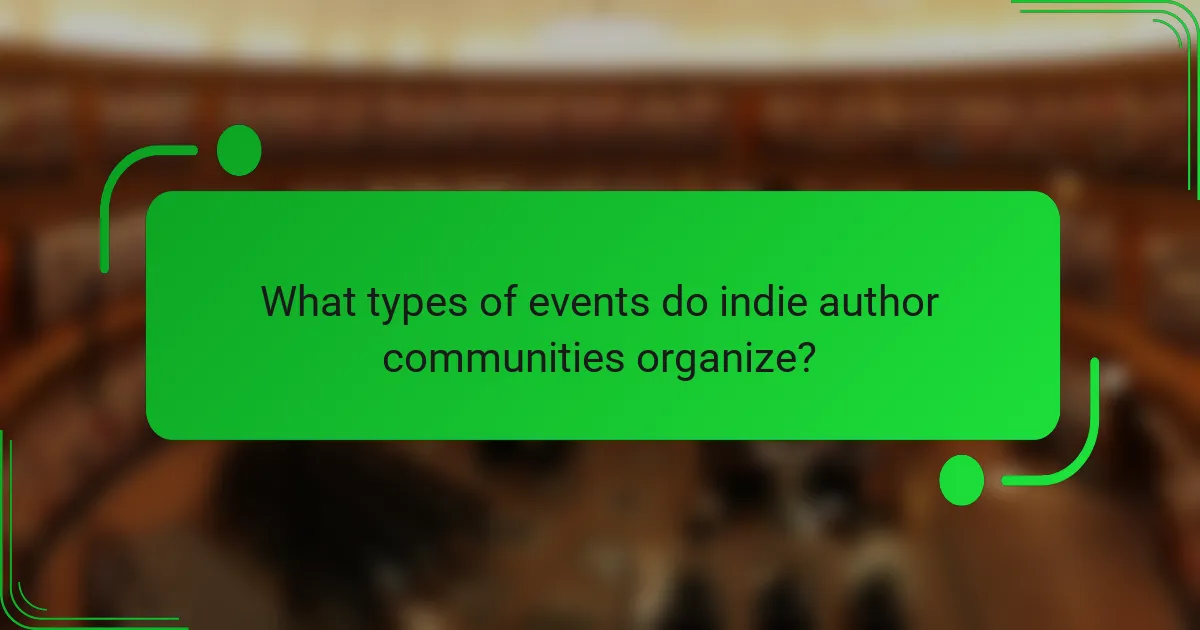
What types of events do indie author communities organize?
Indie author communities organize various events to foster networking and collaboration. These include book fairs, writing workshops, author readings, and panel discussions. Additionally, they may host online webinars, critique groups, and social meetups, providing diverse opportunities for authors to connect and share resources. Such events enhance visibility and support within the indie publishing landscape.
How can participation in events lead to growth opportunities?
Participation in events fosters growth opportunities by enhancing visibility and building connections. Indie author communities provide networking avenues that can lead to collaborations and mentorship. Engaging with peers allows authors to share resources, gain insights, and improve their craft. Additionally, events often feature workshops and discussions that can refine skills and expand knowledge. Through these interactions, authors can discover unique opportunities that may not be available through traditional publishing channels.
What are the most popular formats for author meet-ups?
The most popular formats for author meet-ups include in-person events, online webinars, workshops, and panel discussions. These formats facilitate networking, knowledge sharing, and collaboration among indie authors. In-person events often provide a personal touch, while online formats increase accessibility for a wider audience. Workshops focus on skill development, and panel discussions allow for diverse perspectives on industry trends. Each format serves unique networking opportunities tailored to various author needs.
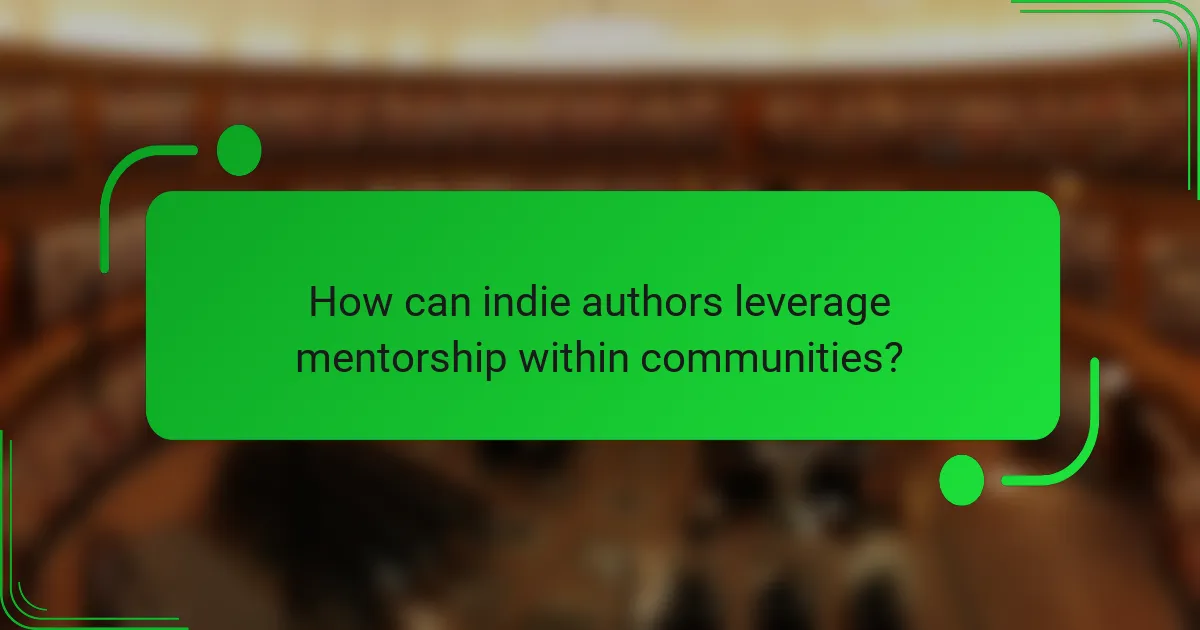
How can indie authors leverage mentorship within communities?
Indie authors can leverage mentorship within communities by connecting with experienced writers for guidance and support. Mentorship fosters skill development and networking opportunities. Engaging in workshops, forums, and online groups enhances visibility and access to resources. Authors can also gain feedback on their work, which is crucial for improvement. Establishing relationships with mentors can lead to collaborations and increased exposure in the literary market.
What are the benefits of finding a mentor in the indie author space?
Finding a mentor in the indie author space offers significant benefits, including guidance and networking. Mentors provide insights into the publishing process, helping authors navigate challenges. They can also introduce authors to valuable connections within the industry. Additionally, a mentor can offer constructive feedback on writing and marketing strategies, enhancing an author’s skills. This relationship often leads to increased confidence and motivation, fostering personal and professional growth in a competitive field.
How can mentoring relationships be established and maintained?
Establishing and maintaining mentoring relationships in indie author communities involves clear communication, mutual goals, and regular engagement. Start by identifying potential mentors or mentees within the community, focusing on shared interests and experiences.
1. Initiate contact through community forums or social media.
2. Set specific objectives for the mentoring relationship.
3. Schedule regular check-ins to discuss progress and challenges.
4. Provide feedback and support to foster growth.
5. Be open to adjusting goals as the relationship evolves.
These steps create a productive mentoring environment, enhancing networking opportunities and resources for indie authors.
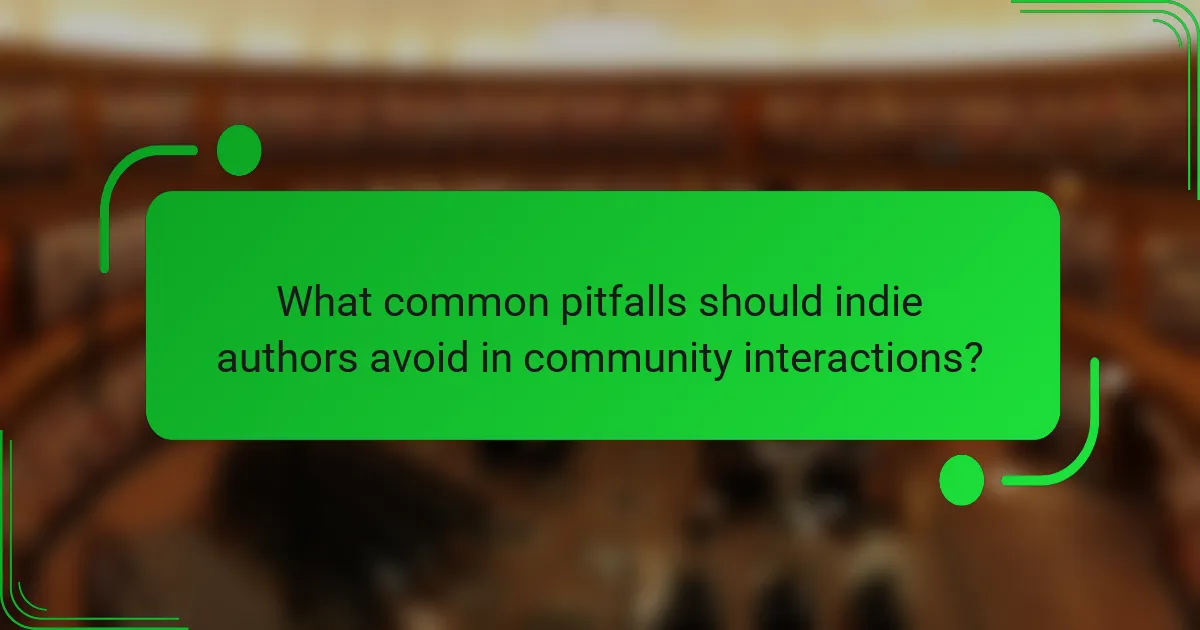
What common pitfalls should indie authors avoid in community interactions?
Indie authors should avoid being overly promotional, neglecting community guidelines, and engaging in negative interactions. These pitfalls can damage relationships and hinder networking opportunities.
1. Excessive self-promotion can alienate potential readers and collaborators.
2. Ignoring community rules may lead to removal from groups or forums.
3. Negative comments or disputes can create a hostile environment and deter engagement.
4. Failing to provide value or support to others can limit reciprocal benefits.
5. Not participating regularly can result in missed connections and resources.
6. Overlooking feedback can hinder personal and professional growth.
How can authors ensure they contribute positively to their communities?
Authors can contribute positively to their communities by engaging actively and sharing resources. Building connections with local writers fosters collaboration and support. Participating in community events enhances visibility and encourages dialogue. Offering workshops or mentorship can empower aspiring authors, creating a nurturing environment. Supporting local bookstores and libraries strengthens literary culture and provides platforms for diverse voices.
What mistakes do indie authors often make when networking?
Indie authors often make mistakes that hinder effective networking. Common pitfalls include failing to research potential connections, neglecting to follow up after initial meetings, and focusing too much on self-promotion rather than building genuine relationships. Additionally, many authors overlook the importance of participating in community events and discussions, which can lead to missed opportunities for collaboration. Prioritising quality over quantity in networking interactions is essential for establishing meaningful connections within indie author communities.
What best practices can enhance community engagement for indie authors?
Indie authors can enhance community engagement by actively participating in events, collaborating on projects, and utilising social media platforms. Building relationships with fellow authors fosters support and networking opportunities. Joining writing groups or forums allows for sharing resources and feedback, which strengthens connections. Regularly engaging with readers through newsletters or virtual book clubs can also deepen relationships and encourage loyalty.
